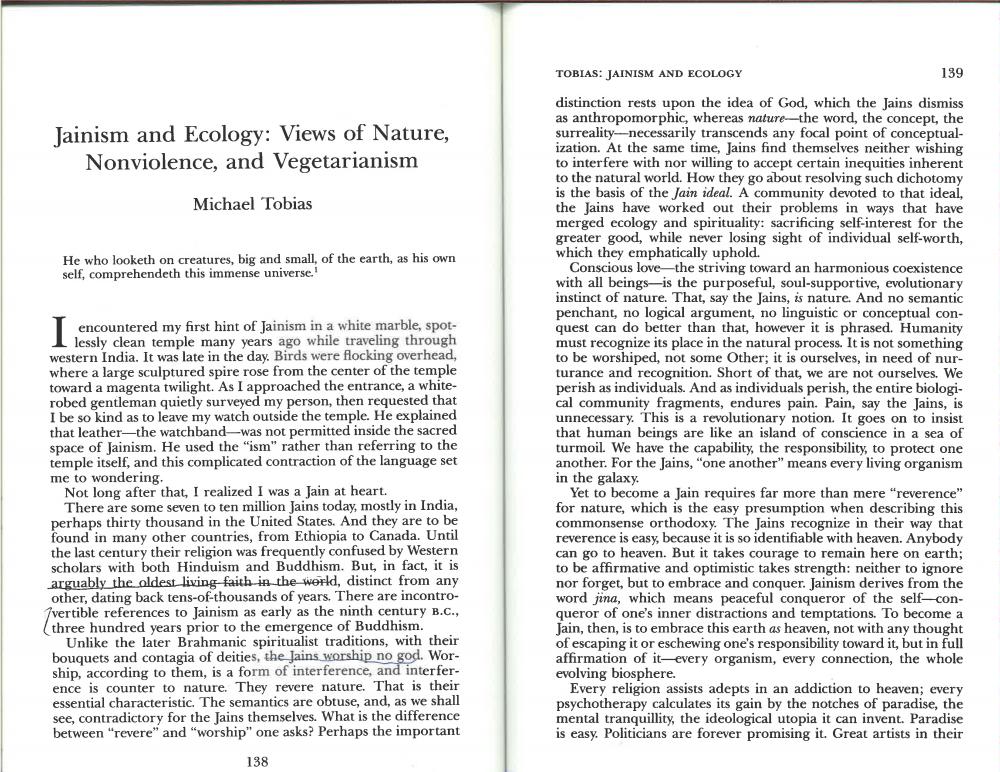Book Title: Jainism and Ecology Views of Nature Nonviolence and Vegeteranism Author(s): Michael Tobias Publisher: Michael Tobias View full book textPage 1
________________ TOBIAS: JAINISM AND ECOLOGY 139 Jainism and Ecology: Views of Nature, Nonviolence, and Vegetarianism Michael Tobias He who looketh on creatures, big and small, of the earth, as his own self, comprehendeth this immense universe.' encountered my first hint of Jainism in a white marble, spot1 lessly clean temple many years ago while traveling through western India. It was late in the day. Birds were flocking overhead, where a large sculptured spire rose from the center of the temple toward a magenta twilight. As I approached the entrance, a whiterobed gentleman quietly surveyed my person, then requested that I be so kind as to leave my watch outside the temple. He explained that leather the watchband was not permitted inside the sacred space of Jainism. He used the "ism" rather than referring to the temple itself, and this complicated contraction of the language set me to wondering. Not long after that, I realized I was a Jain at heart. There are some seven to ten million Jains today, mostly in India, perhaps thirty thousand in the United States. And they are to be found in many other countries, from Ethiopia to Canada. Until the last century their religion was frequently confused by Western scholars with both Hinduism and Buddhism. But, in fact, it is arguably the oldest living faith in the world, distinct from any other, dating back tens-of-thousands of years. There are incontrovertible references to Jainism as early as the ninth century B.C., three hundred years prior to the emergence of Buddhism. Unlike the later Brahmanic spiritualist traditions, with their bouquets and contagia of deities, the Jains worship no god. Worship, according to them, is a form of interference, and interference is counter to nature. They revere nature. That is their essential characteristic. The semantics are obtuse, and, as we shall see, contradictory for the Jains themselves. What is the difference between "revere" and "worship" one asks? Perhaps the important distinction rests upon the idea of God, which the Jains dismiss as anthropomorphic, whereas nature-the word, the concept, the surreality--necessarily transcends any focal point of conceptualization. At the same time, Jains find themselves neither wishing to interfere with nor willing to accept certain inequities inherent to the natural world. How they go about resolving such dichotomy is the basis of the Jain ideal. A community devoted to that ideal, the Jains have worked out their problems in ways that have merged ecology and spirituality: sacrificing self-interest for the greater good, while never losing sight of individual self-worth, which they emphatically uphold. Conscious love the striving toward an harmonious coexistence with all beings-is the purposeful, soul-supportive, evolutionary instinct of nature. That, say the Jains, is nature. And no semantic penchant, no logical argument, no linguistic or conceptual conquest can do better than that, however it is phrased. Humanity must recognize its place in the natural process. It is not something to be worshiped, not some Other; it is ourselves, in need of nurturance and recognition. Short of that, we are not ourselves. We perish as individuals. And as individuals perish, the entire biological community fragments, endures pain. Pain, say the Jains, is unnecessary. This is a revolutionary notion. It goes on to insist that human beings are like an island of conscience in a sea of turmoil. We have the capability, the responsibility to protect one another. For the Jains, "one another" means every living organism in the galaxy. Yet to become a Jain requires far more than mere "reverence" for nature, which is the easy presumption when describing this commonsense orthodoxy. The Jains recognize in their way that reverence is easy, because it is so identifiable with heaven. Anybody can go to heaven. But it takes courage to remain here on earth; to be affirmative and optimistic takes strength: neither to ignore nor forget, but to embrace and conquer. Jainism derives from the word jina, which means peaceful conqueror of the self-conqueror of one's inner distractions and temptations. To become a Jain, then, is to embrace this earth as heaven, not with any thought of escaping it or eschewing one's responsibility toward it, but in full affirmation of it-every organism, every connection, the whole evolving biosphere. Every religion assists adepts in an addiction to heaven; every psychotherapy calculates its gain by the notches of paradise, the mental tranquillity, the ideological utopia it can invent. Paradise is easy. Politicians are forever promising it. Great artists in their 138Page Navigation
1 2 3 4 5 6
